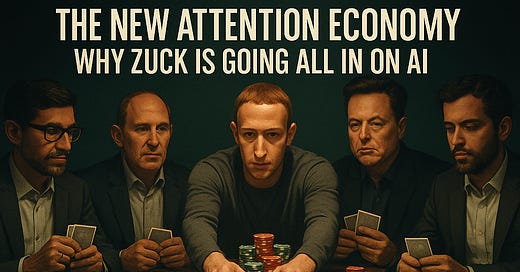Mark Zuckerberg is not pivoting to AI. He is fighting for his life.
Meta’s business model works because of one idea.
If you can monopolize attention you can monetize anything.
Behavior logs and identity feeds gave Meta a moat that advertisers couldn’t ignore. Facebook and Instagram weren’t just platforms. They were behavior casinos. Short-form video, infinite scroll, reaction emojis, and algorithmic nudges rewired human desire into endless loops. Users became resources, not customers.
But that game is over. And Zuck sees the shift clearly.
ChatGPT, Claude, and their successors don’t need you to scroll. They deliver what you want the moment you ask. No feed, no friction, no dependency on social signals. Information is going direct.
That is an existential threat. Not just to Meta, but to the architecture of social media.
Scale-ing
The current AI landscape looks more like ESPN before the trade window right now than CNBC.
Meta just spent $14.3 billion for a 49 percent stake in Scale AI. That values Scale at over $29 billion and brings its 28‑year‑old CEO Alexandr Wang to Meta. Wang now leads Meta’s Superintelligence Labs as chief AI officer while staying on Scale’s board. That investment is not defensive. Meta bought boardroom leverage, premium data labelling expertise, and business velocity in one move.
What Meta is trying to do is become a vertically integrated tech stack, with a generative AI operating system.
What you need to accomplish this are a few things:
Energy
At its most basic level, you cannot be energy constrained. You need cheap, abundant energy to power your data centers.
Compute
You need data centers, compute, and GPUs.
You need a foundational model, built from the ground up
A pre-trained large language model built using the compute and energy you sourced
You need data
And lots of it. High quality labelled data to post train your large language model to give you an edge and moat over your competitors
You need talent density
You need the best AI researchers in the world to come up with innovative new approaches like “mixture of experts” which reduces cost exponentially without compromising on quality
Without all five of these pillars, your Mag 7 company will go the way of Sun Microsystems.
For example, Amazon is investing in nuclear, and leasing current plants to ensure supply. They are baking their own silicon, training their own foundational model Nova, hosting it on AWS Bedrock, and sourcing high quality labelled data from both internal and external channels.
Microsoft is mirroring this approach. They are investing in nuclear, acqui-hired Mustafa Suleyman of previous Deep Mind fame, building on top of Azure, and maintain a 49% stake in OpenAI.
Tesla has Grok, the Twitter data, Tesla vision and autopilot, the Colossus megastructure at Memphis, and, of course, the talent density Elon Musk attracts.
This recent spending frenzy was Zuckerberg recognizing that they are falling behind. And making big moves to fix it.
The War Chest
Meta is throwing money around like the New York Yankees. And its no surprise why.
In June of 2025, five of Meta’s top researchers left to start their own companies, or pursue better offers, most notably, Joelle Pineau, Meta’s Vice President and Head of AI Research
In response, Meta poached Daniel Gross, former CEO and cofounder of Safe Superintelligence Inc. Gross built AI infrastructure alongside Ilya Sutskever, one of the Godfathers of AI who cowrote the attention mechanism paper. Getting Gross to come to Meta was a coup.
Meta then went on to recruit ten senior AI researchers from OpenAI, Google, Anthropic. Compensation includes signing bonuses rumored up to $100 million and packages in the tens of millions per year. And its no wonder why.
Attention Economics in Freefall
Social media ran on time arbitrage. Ads, data, engagement. But AI inverts that. A good model saves time. A great one multiplies it. As users shift from consumption to outcome, from search, to answer, they bypass the slot machine. They make a query and get the result. That breaks Meta’s (and Google’s) core exchange: attention for ads.
Every minute someone uses a generative agent, whether for business or entertainment, is a minute not spent farming dopamine on Reels. That’s why Zuckerberg isn’t hedging. He can only be all in.
Founder‑Mode or Bust
Apple is treating AI like a feature. Getting lapped by everyone before finally conceding defeat, and currently on track to tap Anthropic to improve switchboard operator Siri.
Meta in contrast, is treating AI like an operating system. The difference matters. Every other big tech company has a core business they can protect. Amazon has AWS and Retail. Google has Search and YouTube. Tesla has the electric car market, and Microsoft has Windows. They can all pivot to AI and incorporate it into their core businesses.
Meta has no core beyond attention. And their market share is leaking.
There is no guarantee this works. But the alternative is a legacy brand riding yesterday’s dopamine loops. Talent drift. Product stagnation. Acquisition and confinement to tech history.
Meta is paying $100 million sign‑ons. Its hiring ruthlessly. Its going all in.
Because AI doesn’t just compete for attention. It is the new attention economy.








One often overlooked advantage Meta has is that many of their products actually foster user connection while most AI dominated products create individualized experiences. In an AI dominated landscape users may crave organic user interactions over the synthetic AI interactions.
Agree that AI saves users time, but the ad inventory impacted is search (Google) and sites (publishers). Which is where new offerings (ie paywalls) come in to support an explicit value exchange between the new user agents - AI chat & research instead of browse - and publishers.
Social media draws a crowd looking for something different than answers/advice/plans. Not sure what Meta has planned for an AI based revenue model.